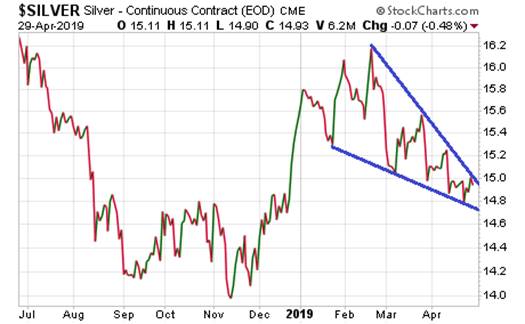Silver Market Alert: Powerful Bullish Setup Takes Shape / Commodities / Gold & Silver 2019
 The silver market appears to be setting up for a big move.
The silver market appears to be setting up for a big move.
After spending this spring stair-stepping lower in a narrowingrange, silver prices have formed a falling wedge pattern. That pattern usuallyresolves in a powerful directional breakout. The good news for bulls is thatfalling wedges usually break out to the upside.

Commercial hedgers and bullion banks (i.e., “smart money”) in the silverfutures market have significantly trimmed their short positions over the pastcouple weeks – a bullish development. While their net positioning isn’t yet atan extreme, it is more favorable than not for a price rally to commence in thenear future.
Of course, neither futures traders nor chart patterns are 100%reliable. Nor do they have any particular implications for where prices may beheaded years from now.
Long-term investors can benefit from identifying opportune entrypoints on the charts. But if a big multi-year bull market is to come, it willbe driven by fundamentals – supply, demand, relative valuations, inflationrates, and investor sentiment.
Let’s therefore drill down into silver’s fundamentals.
The Silver Institute is widely considered to be an authoritativesource. The Institute released its annual World Silver Survey inApril, which showed global silver demand rose by 4% in 2018 to more than 1billion ounces. At the same time, supply from mine production fell 2% last yearto 855.7 million ounces.
At first glance, these numbers present a compelling case forhigher silver prices. Demand appears to be outstripping supply.
However, there is no actual physical shortage. The mining supplydeficit is (for now) being made up by scrap recycling and other secondaryabove-ground sources of physical silver.
There ultimately will be a physical shortage if demand continuesto rise while mining production falls. The market’s way of averting such ashortage is through higher prices to incentivize more output and encouragethrifting by industrial users.
Silver is a difficult market to forecast in part because thereare few primary silver miners in existence. Most silver production comes fromgold and base metals mining operations.
The gold mining industry is shrinking as reserves get depletedwithout being replaced by new discoveries and small companies get gobbled up bylarger ones.
Some industry insiders believe “peak gold” has arrived, whichwould imply annual global gold mining output heads down in the years to come.
Silver can be viewed as a leveraged play on gold. Silver is themore volatile of the two monetary metals.
And right now it happens to be extremely cheap versus gold.Silver currently trades at about 1/86th the price of gold, just off a 25-yearlow hit earlier in April.
A mean reversion toward a more typical silver:gold ratio wouldimply massive silver outperformance going forward. At silver’s last majorcyclical peak in 2011 above $49/oz, the white metal traded at 1/30th the goldprice. Going back further in history, there is precedent for further narrowingin the gold:silver gap.
The wild card is investment demand, which often actually risesduring periods of rising prices. It’s human nature to want to join a trend inmotion – and over the past few years, U.S. retail investment demand has beensoft amidst a trendless silver market.
Only the most farsighted, hardy, and patient investors buyaggressively while the market isn’t going anywhere. They stand to reap thebiggest gains, though, when prices finally do take off.
Weak sales figures over the past couple years on popular bullion products suchas Silver Eagles suggest investors remain largely disinterested insilver. However, digging deeper into World Silver Survey data,we find that global investment demand for bars shot up by 53% in 2018.
Much of that demand came from India and China, where evidentlymore people of wealth are deciding to stack silver bars.
Gold has long been a powerful status symbol in Asia. But silverrepresents a more practical, more affordable way for the masses to hold wealthand conduct barter and trade transactions.
While central banks around the world (including China’s)accumulate gold at an accelerating pace, individuals accumulating their ownmonetary reserves in the form of silver bullion appears to be anemerging trend in the emerging world.
The bottom line is that the underlying fundamentals of thesilver market are turning more and more favorable, even though the headlinesaren’t – yet.
Stefan Gleason isPresident of Money Metals Exchange, the national precious metals company named 2015"Dealer of the Year" in the United States by an independent globalratings group. A graduate of the University of Florida, Gleason is a seasonedbusiness leader, investor, political strategist, and grassroots activist.Gleason has frequently appeared on national television networks such as CNN, FoxNews,and CNBC, and his writings have appeared in hundreds of publications such asthe Wall Street Journal, Detroit News, Washington Times, and National Review.
© 2019 Stefan Gleason - All Rights Reserved
Disclaimer: The above is a matter of opinion provided for general information purposes only and is not intended as investment advice. Information and analysis above are derived from sources and utilising methods believed to be reliable, but we cannot accept responsibility for any losses you may incur as a result of this analysis. Individuals should consult with their personal financial advisors.
© 2005-2019 http://www.MarketOracle.co.uk - The Market Oracle is a FREE Daily Financial Markets Analysis & Forecasting online publication.
